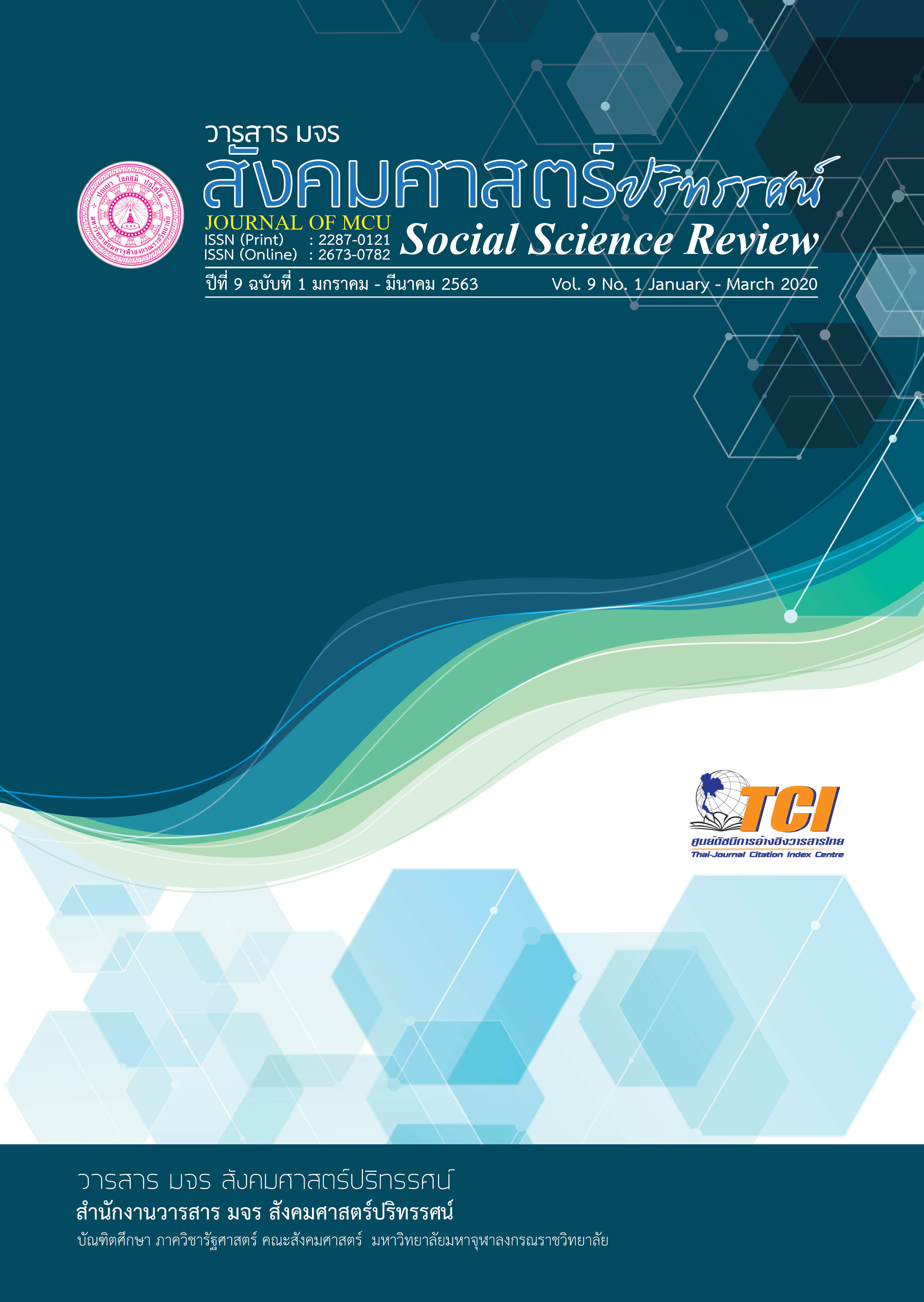มานุษยวิทยาดิจิทัลภายใต้กรอบแนวคิดทฤษฎีเทคโนโลยีสื่อกลาง
คำสำคัญ:
มานุษยวิทยาดิจิทัล, ทฤษฎีเทคโนโลยีสื่อกลาง, กรอบแนวคิดในการศึกษาสังคมดิจิทัลบทคัดย่อ
บทความนี้มีวัตถุประสงค์เพื่อนำเสนอพัฒนาการและกรอบในการศึกษามานุษยวิทยาดิจิทัล ผ่านแนวคิดทฤษฎี Technological Mediation Theory หรือ “ทฤษฎีเทคโนโลยีสื่อกลาง” ซึ่งทำการศึกษาและสรุปออกมาเป็นกรอบแนวคิดสำหรับการศึกษาความสัมพันธ์ระหว่างบทบาทของเทคโนโลยีที่มีต่อมนุษย์และสังคมไว้ ทั้งนี้ทฤษฎีดังกล่าวได้มีพัฒนาการมาจากสำนักปรากฏการณ์นิยมที่มี มาร์ติน ไฮเดก ผู้นำเสนอแนวคิดที่ให้ตระหนักถึงบทบาทของเทคโนโลยีที่มีมากกว่าการเป็นแค่วัตถุสิ่งของ แล้วมีการพัฒนาต่อยอด มาสู่ยุคร่วมสมัยปัจจุบัน มาเป็นสำนักหลังปรากฏการณ์นิยมโดยมี ไอเด เวอร์บีค และโรเซ็นเบอร์เกอร์ เป็นนักคิดที่สำคัญและมีอิทธิพลต่อนักคิดคนอื่นๆ ที่สนใจศึกษาในแง่มุมเดียวกัน ตลอดจนรวมไปถึงการศึกษาเทคโนโลยีดิจิทัลที่มีอิทธิพลต่อการกำหนดหรือปรับเปลี่ยนรูปแบบการดำรงชีวิตของมนุษย์ให้ไปสู่ความเป็น Digitalization (ดิจิทัลไลซ์เซชั่น) หรือการทำให้กลายเป็นดิจิทัล ซึ่งการศึกษามานุษยวิทยาดิจิทัลนั้นอาศัยระเบียบวิธีวิจัยโดยทั่วไปในการศึกษาบทบาทของเทคโนโลยี และรวมถึงเทคโนโลยีดิจิทัลมีผลต่อการจัดระเบียบความสัมพันธ์ของมนุษย์กับโลก และสังคม โดยการใช้กระบวนการศึกษาตามแนวทางที่เป็นที่นิยมของนักมานุษยวิทยาทั่วไปในปัจจุบัน เช่น การใช้วิธีการรายงานชีวิตประจำวัน
เอกสารอ้างอิง
สุกมล มุ่งพัฒนสุนทร. (2561). ยุคแห่งสังคม AI: หาก AI มาแทนที่มนุษย์. สืบค้น 26 กุมภาพันธ์ 2561, จาก https://www.stou.ac.th/thai/grad_stdy/Masters/ฝสส/research
Aagaard et al. (2018). Posthenomenological Methodologies. London: The Rowman & Littlefield Publishing Group. Inc.
Boellstorff, T. (2013). Digital Anthropology. Oxford Bibliographies Online. Retrieved February 26, 2018, from https://www.oxfordbibliographies.com/view/document/obo9780199766567/obo-9780199766567-0087.xml
Gualeni, S. (2015). Virtual Worlds as Philosophical Tools: How to Philosophize with a Digital Hammer Hardcover. London: Pal-grave MacMillan.
Heidegger, M. (1977). The Question Concerning Technology and Other Essays. Translated by William Lovitt. New York; London: Garland Publishing.
Ihde, D. (2009). Postphenomenology and Technoscience. Edited by Leonore Langsdorf. The Peking University Lectures. Albany: SUNY Press.
Ingold, T. (1997). Eight Themes in The Anthropology of Technology. Social Analysis: The International Journal of Social and Cultural Practice, 41(1), 106-138.
Kemp, S. (2018). Digital 2018 in 2018: World’s internet users pass the 4 billion mark. Retrieved February 26, 2018, from https://wearesocial.com/blog/2018/01/global-digital-report-2018
Miller, D. (2012). Open access, scholarship, and digital anthropology. HAU: Journal of Ethnographic Theory, 2(1), 385–411.
Mungpattanasunthon, S. (2019). Disruptive Technology reshapes human being, societies, roles and relations: the hypothesis of Technology Mediation. Retrieved February 26, 2018, from http://gscm.nida.ac.th/uploads/files/1550113978.pdf
Pfaffenberger, B. (1992). Annu Rev Anthropol. Retrieved February 26, 2018, from https://pdfs.semanticscholar.org/8a67/8518d47c0c2e0be4fe2f7b585e4e909ce176.pdf
Powdermaker, H. (1951). Hollywood: The Dream Factory An Anthropologist Looks at the Movie Makers. London : Secker & Warburg. Retrieved February 26, 2018, from https://mediaethnographies.files.wordpress.com2009/08/powderlarge.pdf
Rosenberger, R., & Verbeek, P.P.C.C. (2015). Postphenomenological Investigations: Essays on Human-Technology Relations (Postphenomenology and the Philosophy of Technology). Lanham, MD: Lexington Book.
Think about Wealth. (2019). The statistics of digital user around the world 2019. Retrieved February 26, 2018, from https://www.thinkaboutwealth.com/digitalstatworldthailand2019/
ดาวน์โหลด
เผยแพร่แล้ว
รูปแบบการอ้างอิง
ฉบับ
ประเภทบทความ
สัญญาอนุญาต
ลิขสิทธิ์ (c) 2020 วารสาร มจร สังคมศาสตร์ปริทรรศน์

อนุญาตภายใต้เงื่อนไข Creative Commons Attribution-NonCommercial-NoDerivatives 4.0 International License.
เพื่อให้เป็นไปตามกฎหมายลิขสิทธิ์ ผู้นิพนธ์ทุกท่านต้องลงลายมือชื่อในแบบฟอร์มใบมอบลิขสิทธิ์บทความให้แก่วารสารฯ พร้อมกับบทความต้นฉบับที่ได้แก้ไขครั้งสุดท้าย นอกจากนี้ ผู้นิพนธ์ทุกท่านต้องยืนยันว่าบทความต้นฉบับที่ส่งมาตีพิมพ์นั้น ได้ส่งมาตีพิมพ์เฉพาะในวารสาร มจร สังคมศาสตร์ปริทรรศน์ เพียงแห่งเดียวเท่านั้น หากมีการใช้ภาพหรือตารางหรือเนื้อหาอื่นๆ ของผู้นิพนธ์อื่นที่ปรากฏในสิ่งตีพิมพ์อื่นมาแล้ว ผู้นิพนธ์ต้องขออนุญาตเจ้าของลิขสิทธิ์ก่อน พร้อมทั้งแสดงหนังสือที่ได้รับการยินยอมต่อบรรณาธิการ ก่อนที่บทความจะได้รับการตีพิมพ์ หากไม่เป็นไปตามข้อกำหนดเบื้องต้น ทางวารสารจะถอดบทความของท่านออกโดยไม่มีข้อยกเว้นใดๆ ทั้งสิ้น





